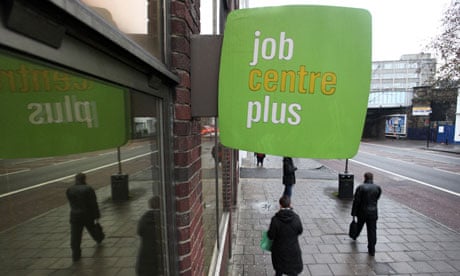It was a litany of nastiness couched in the language of reform, fairness and helpfulness. A series of measures to bring the spending review speech to a triumphant political finale, appealing to poisonous prejudice but framed to minimise any such suspicion. In order to "change lives for the better" and reduce "dependency", George Osborne introduced the "upfront work search" scheme. Only if the jobless arrive at the jobcentre with a CV, register for online job search, and start looking for work will they be eligible for benefit – and then they should report weekly rather than fortnightly. What could be more reasonable?
More apparent reasonableness followed. There will now be a seven-day wait for the jobseeker's allowance. "Those first few days should be spent looking for work, not looking to sign on," he intoned. "We're doing these things because we know they help people stay off benefits and help those on benefits get into work faster." Help? Really? On first hearing, this was the socially concerned chancellor, trying to change lives for the better, complete with "reforms" to an obviously indulgent system that demands too little effort from the newly unemployed to find work, and subsidises laziness. What motivated him, we were to understand, was his zeal for "fundamental fairness" – protecting the taxpayer, controlling spending and ensuring that only the most deserving claimants received their benefits.
Osborne has taken the Orwellian misuse of language to new levels. Losing a job is traumatising: you don't skip down to the jobcentre with a song in your heart, delighted at the prospect of doubling your income from the munificent state. It is financially terrifying, psychologically mortifying and you know that support is minimal and extraordinarily hard to get. You are now not wanted; you are now excluded from the work milieu that offers purpose and structure in your life, along with the company of others. Worse, the crucial income to feed yourself and your family and pay the bills has disappeared. Of course you want to find a job as fast as you can. The sooner the whole experience is behind you the better. Ask anyone newly unemployed what they want and the answer is always: a job.
But in Osborneland, your first instinct is to flop into dependency – permanent dependency if you can get it – supported by a state only too ready to indulge your mendacity. It is as though 20 years of ever-tougher reforms of the job search and benefit administration system never happened. The principle of British welfare is no longer that you can insure yourself against the risk of unemployment and receive unconditional payments if the disaster happens. Even the very phrase "jobseeker's allowance" – invented in 1996 – is about redefining the unemployed as a "jobseeker" who has no mandatory right to a benefit he or she has earned through making national insurance contributions. Instead, the claimant receives a time-limited "allowance", conditional on actively seeking a job; no entitlement and no insurance. Britain has led the world in linking the administration of benefits to the job search. What's more, at £71.70 a week, the jobseeker's allowance is one of the least generous in the EU.
In this context, it's insane to describe as "help" making an unemployed person wait seven days for a mean benefit they need at a moment of crisis in their lives. And to present "upfront work search" as a pioneering transformation of the jobcentres' operations, already entirely based on making benefit conditional on actively applying for jobs, is to compound the felony.
Osborne was not interested in help. His purpose was political positioning: to locate the Conservative party as the friend of the taxpayer, Labour as the welfare party and to make his "reforms" the baseline normal. It is a big bet: that those at the receiving end of the punishment will remain voiceless and illegitimate while the majority will continue to see welfare as a burden and the breathtaking rollback of the state as an unavoidable necessity. To succeed, there must be no big questions asked about the operation of the British economy and its management, none about the impact on British society, and widespread acceptance that the state in any guise is useless. We are all conservatives now.
I am not so sure. The evidence of growing hardship is all around. The Children's Commissioner has reported that the number of children living in poverty will have risen from 2.3 million in 2010 to 3 million in 2015. Two million people survive from week to week courtesy of payday loans. The Resolution Foundation found that the numbers of people working on zero-hour contracts has risen to 208,000 – a figure it considers a massive underestimate because 150,000 domiciliary care workers alone are known to be on zero-hour contracts. The use of food banks is exploding.
The TUC austerity bus, on a national tour, features harrowing personal stories of how the new bedroom tax is forcing councils – themselves under enormous pressure – to move tenants from their homes. The Joseph Rowntree Foundation says that over the last five years social housing rents have risen 26%, energy costs 39% and transport costs 30%. Yet benefits for both those in and out of work are being cut in real terms for the first time since the 1930s. As need becomes acute, provision of services at the local level is being emasculated. Sir Merrick Cockell, Tory chair of the local government association, says the further 10% cut in local government budgets, on top of the existing cut of a third, will stretch services to breaking point. When he also accuses the whole top-down approach as "feudal", take note. This is civil society beginning to stir itself.
There is a plausible alternative – a slower pace of cuts, more revenues from a wider tax base, a new social settlement, a recasting of the relationship between the centre and locality and, above all, a dramatic reshaping of British capitalism to make it more innovative and productive. Osborne believes his bet will succeed because no coalition can be constructed to argue for a contrary position: that while Sir Merrick and the children's commissioner may fulminate, there is no possibility of their becoming part of a broad-based coalition arguing for change, including, say, both unions and business.
But nastiness disguised as help, and coming with no promise of anything but more of the same, is not the way to a majority coalition either, and the social impact is desperate. The spending review looked clever for 24 hours, but discomforting Ed Balls on the Today programme is not a long-term political strategy. Instead, it may prove the catalyst for an effective opposition coalition. The chancellor has gone a step too far.

